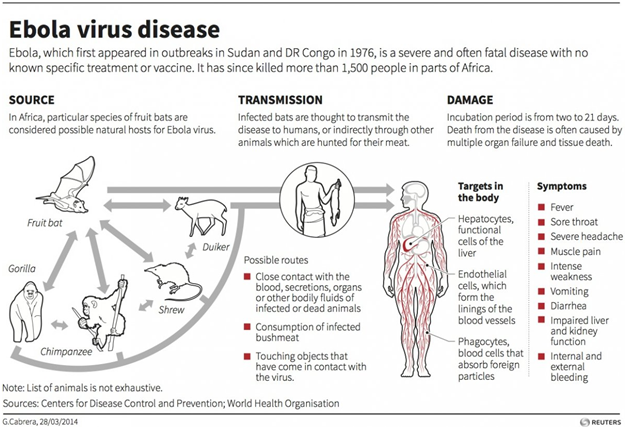Ebola and Pregnancy
(image from www.NaturalNews.com)
What is it?
Ebola is a virus that was named after the Ebola river in the Republic of Congo. The Ebola virus is spread from human to human through contact with bodily fluids, and from animal to human contact from consumption of raw meat. An infected person with Ebola may open a door, and the person after them may touch the door handle too. The second person will have Ebola on their hands, but if they put their hands in their mouth, or rub their eyes, they may be infected through the mucous membranes, or if they have a small cut on their hands, the virus can enter through that. Unlike infections like flu or measles, which can be spread by virus particles that remain in the air after an infected person coughs or sneezes, transmission of Ebola from person to person is by direct contact with the blood or body fluids (eg vomitus, urine, stool, and semen) of a symptomatic infected person. This is further complicated by the fact that in patients who die of Ebola virus infection, virus can be detected throughout the body. Ebola virus can be transmitted in postmortem care settings. In men who have been cured of Ebola, the virus can still be found in their semen up to 7 wks later.
The good news is that the likelihood of contracting Ebola is considered low unless there has been this type of specific exposure. There is no evidence of transmission of Ebola virus through

intact skin and the Ebola virus is not spread through routine, social contact (such as shaking hands) with asymptomatic individuals.
Ebola was first found in 1976, at that time it was noted that the survival for anyone infected, was about 50-60%. They did note that the survival rate for pregnant women was much less, at that time 14 out of 15 pregnant women with Ebola died (4% survival).
Signs and Symptoms
The time period from infection to seeing symptoms (incubation period) varies from 2-21 days. We all have different degrees of immunity, and this probably plays a very big role in survival after infection. You are not considered infectious until you have symptoms. The symptoms of acute Ebola infection are: the sudden onset of fever fatigue, muscle pain, headache, sore throat, vomiting, diarrhea, rash, symptoms of impaired kidney and liver function, and in some cases, both internal and external bleeding (e.g. oozing from the gums, eyes, blood in the stools). These symptoms are similar to the regular flu at first, however the severe diarrhea, is a significant difference. There are blood tests to assess if one is infected. During pregnancy, many women reported to the hospital with fetal demise, miscarriage and severe hemorrhage. There are no direct studies of Ebola in pregnancy, and the only information we know is from reviewing past cases of pregnant women with Ebola.
The limited evidence from these outbreaks does suggest that pregnant women are at increased risk of severe illness, complications and death when infected. Reported complications include spontaneous abortion and severe hemorrhage in pregnancy. Infants born to mothers who are in the terminal stage of disease are invariably infected, with high neonatal mortality rates reported. I suspect there are two issues concerning pregnancy. The first is that there is a component of immune suppression in pregnancy which may prevent the mother from attacking the virus compared to non-pregnant women, secondly, the virus probably crosses the placenta, and forms a reservoir, such that the mother cannot fight it, until the baby is delivered, and the virus load decreased. Unfortunately by this time, the mother has lost a great deal of blood, and function that they usually end up with multi-organ failure, and death.
Treatment:
The treatment at this time is supportive: IV fluids, and replacing electrolyte losses secondary to diarrhea, and giving blood products where necessary to treat severe anemia secondary to hemorrhage. There are current vaccine trials in place.
The best treatment is prevention. In the United States, the current cases are in isolation, and as we approach the 21 day incubation period, we will learn if they are infected, or on the way to recovery. In the infected areas, sanitation measures, isolation of infected patients, and attempts for a vaccine are in full force, however this has triggered a separate crisis, in that women who are pregnant cannot go to the hospital/get medical attention because all resources are being used treating Ebola patients. Also the women are scared to go to the hospital for fear of contracting Ebola there surrounded by Ebola patients. Accordingly they are delivering out of the hospital, and there are complications.
How if Affects the Baby
Ebola is associated with miscarriage, intrauterine fetal demise, and if the pregnancy survives to term, the neonate is invariably infected.
Copyright V.Sachar MD 2014. All Rights Reserved.
No part of this may be reproduced without expressed approval from the author.
This blogpost is not to be considered medical advice and is for entertainment purposes only, consult your personal
doctor before making any changes to your health care regimen.



